Beneath Ceaseless Skies #170 Read online
Issue #170 • Apr. 2, 2015
“Primaflora’s Journey,” by Cat Rambo
“Wild Things Got to Go Free,” by Heather Clitheroe
For more stories and Audio Fiction Podcasts, visit
http://beneath-ceaseless-skies.com/
PRIMAFLORA’S JOURNEY
by Cat Rambo
Primaflora ran fast, snow crunching under bare feet. She launched herself at the pond’s ice-covered surface at the last moment, laughing helplessly as she slid across it, her sister dryads’ faces whizzing past.
“My turn, my turn!” Rue yelled as Primaflora fought to regain her balance and her breath. Rue pushed off and slid across the ice, colliding with her in a flailing of limbs from which they emerged still standing, clutching each other for balance. The day was brilliantly cold and clear, and their hair was strewn with ice crystals, their skin gone pale with winter’s touch.
A branch snapped in the forest, too heavy to be anything they knew. Primaflora smelled smoke.
The first scream echoed in the distance, even as the humans rushed them with nets and fire and steel.
She ran this way and that, but there was always a human in front of her, shouting, blocking her, torches in their hands blazing with terrible flame, driving her into the net. She thrashed in its inexorable clutch.
While she was dragged away through the snowdrifts, she could hear the sound of axes behind her, harvesting the grove. The dying cries of the trees rang through her as though she were a wooden bell being shaken by a hurricane, clapper battering against her ribs.
At the river, a great steamboat at anchor off shore, a smaller rowboat drawn up moored on the bank. A man stooped and examined her. He was barrel-shaped and smelled foul, like smoke and sweat. She tried to bite him as he rolled her head back to look it over, but he dodged her teeth with practiced ease before releasing her and rising.
“Loose the other one, she’s too young,” he said to the sailor beside him.
“Duke’s bounty, sir. Hate to lose out on all that coin.”
The man shook his head. “We leave some to breed. That way when we come again there’ll be more ready to harvest.”
She was chained with a cluster of other dryads to the railing near the back of the boat. They watched as the logs from her grove were brought aboard, stacked towards the front and oozing thick red sap like her uncontrollable tears. She saw the tree that had borne her, and sorrow doubled her over, gasping for breath.
“What is this place?” she said when she could talk again, but the dryads on either side paid her no mind. They were all weeping, lost in their misery.
She tried to call to a sailor as the woman passed, but the human paid her no more mind than if a bird had twittered. The others couldn’t even manage that. They clung together, weeping, hair mingled, as the boat’s horn gave out a long satisfied blast, as though announcing its victory over the grove.
The deck trembled beneath her feet as the boat got underway. The great steam engine roared, moving the paddle wheel that sped their progress down the river. The chains on her wrists clinked together in a sullen metallic chorus as the boat headed out into the main current.
In the grove, she had thought simple thoughts, of sunlight and the lives of rabbits and nightsingers. Things did not change from day to day except in gradual ways. Here they changed and changed and changed, a progression that was changing her in turn.
She was thinking complicated thoughts now, about things she was not sure that dryads ever contemplated: what it would be like to take an axe to a sailor, to cut a human down as they had cut her tree down. Sometimes they were so close. But there were so many of them, and she was chained.
They treated her with an impersonal air, as though she were only a block of wood. Waterstrand, one of the dryads taken before her, said that at first the sailors had joked about enjoying her until the captain put a stop to it, saying that she was valuable only in her present condition.
What was that, Primaflora wondered. All of them were dryads near Rooting age.
What did it mean, that they’d been harvested? None of the dryads knew, and no sailor would answer the question.
She didn’t like the sound of it.
Not at all.
Primaflora said, “Boy.”
The youngest sailor had been passing, pretending not to look at the dryads chained to the railing. When she spoke, his head bobbed up, awkward as a new fawn’s first leap. She used the trade tongue, the same one the sailors spoke. Her facility in it had increased with every passing day of listening to the sailors’ chatter.
He did not reply, just looked at her. Another sailor tugged at his arm.
“C’mon,” he said. “Captain doesn’t like us talking to them.”
But the boy kept staring at her. She wondered what sort of sight she made. No doubt the same as the other dryads: greenish skin darkened to a cedary brown by exposure to the sun, tangled hair growing, growing in her distress, in their distress, till it cloaked their forms.
Another tug at his sleeve. “We’ve work to do. You’ll get enough of trimming them down fore the trip’s over. Archis said they’d overgrow the ship if they had enough time and we let them.”
The pair moved along past them. Primaflora stared after their backs.
She thought, I’d overgrow it if I could. She imagined the ship overtaken by her hair, of it crawling over them in their sleep, choking them, filling the ship’s chambers and holds, overflowing the decks till it covered the ship to form an island, a floating mass that would root in the water, take hold, resist the drift, and finally make a new grove, tiny but perfect, the trees holding it safe and daughters playing on the deck where they were now chained.
Till more humans came.
Thoughts of the inevitable future wracked her. There would be no peace, only more and more groves cut down, till none remained, till the dryads were only a memory shared by the oldest trees.
* * *
The rub of metal around her wrists was what bothered Primaflora the most. Not the standing with the others, chained on the back deck, exposed to wind and cold. Or the catcalls of the sailors, appraising each dryad in terms of beauty and body. Or the pull of her home grove, dwindling with each mile of river the boat achieved. She wouldn’t die of that, at least until she Rooted and became vulnerable. The lack of food didn’t bother her either, as long as there was plenty of sunshine and water.
They all managed to send their hair along the boat’s side, down to the water line to drink there. But when the captain was cranky, he would shout that they might tangle the paddlewheel and would order a sailor to clear it.
The one who was dispatched was often the youngest, who would come with machete and apologies to hack away their hair. It didn’t hurt, any more than cutting his own hair would have hurt, but they pretended that it did, in order to use their reproachful cries to make him wince.
They had little enough to amuse them. The dryads knew they were as good as dead. Dryads and naiads captured and taken to Tabat never returned. If they wanted to escape, they all agreed in their whispered conversation, relying on the great engine’s noise to mask what they were saying, it would be best to get away before the boat reached the city.
She suspected that the Captain, if not all the crew, knew exactly what they were plotting. They were not the first dryads The Swan had carried. The railing was matted with fine, greenish root-hairs, layers upon layers of them in the spots where the crew were too lazy to scrub. All along the side of the boat, on the inside of the railing, pictograms scratched by former prisoners lay beneath the fuzz of rootlets.
Some were easy to decipher: Six Flowers, Sun and Rain, Riverfern. Other
s were harder, lacking an established alphabet. A clamshell might mean a clam but more likely some other concept, or food, or the sea, and when it was coupled with what could have been a candle or eel or sprout, who was to know the precise name of the former prisoner, her fate as unknown as Primaflora’s, who had scratched that in letters no more than a fingernail high in the space beside the hasp to which Primaflora was secured?
How odd, that the dryads who scratched them could be long gone but their symbols remain behind. That wasn’t the way of the forest. There, fallen trees changed. They sheltered little animals and insects, and all the while mushrooms and roots ate away at them till they were only loam, sinking into the earth, becoming part of the whole.
That was what disturbed her about the symbols. They didn’t decay; they stayed behind in the wood, and were they part of the dryad still or something else, utterly divorced and alone, no longer part of the whole? She couldn’t decide. It perplexed her. She spent hours staring at them.
It was as good a way to pass the time as weeping.
* * *
The boat bumped against the dock. Primaflora could feel it through the sensitive soles of her bare feet. They had arrived in Tabat. They had found no clever plan or opportunity along the way. Here they were, until they were killed or else they withered and died.
Tears stung the back of her eyes, and her hands writhed together of their own accord. The boys had reaped a last harvest of hair, despite the dryads’ protests. It had been stuffed in burlap sacks, lashed to the logs stacked along the boat’s prow. She could feel the root-mass, still half-alive, still capable of growth.
The Captain supervised two deck hands as they transferred the dryads’ chains one by one to the topmost log, which had been drilled with holes to form a crude coffle. “You’ll carry that to the castle,” he said. One muttered a protest, and he shifted his weight, touching the whip at his belt. “Without malingering or backtalk,” he added. He indicated a wagon standing near the dock, drawn by a gryphon. “Stand by. When it’s your turn, go fall in line behind that.”
Minotaurs were unloading the bales of dried canes and furs, the barrels of saps and waters and fermented juices. The dryad beside Primaflora, Columbine, stretched her hands out towards them. Her nails had grown yellow and horny from too much water and cold.
“Help me, brothers!” she cried, her voice pitched plaintive and heartbroken.
The minotaurs did not look at her. They simply kept about their business: great rolls of birch bark, as thick around as Primaflora’s waist, smelling of rain and earth. The minotaurs lifted them without effort. They were columns of muscle, vast brown eyes as placid as the river, unmoved by the dryads’ plight. Primaflora wondered how often they had seen this scene before. Columbine began to weep, and another dryad, Falling Water’s Song, rubbed Columbine’s shoulder.
It felt colder now than it had at any point of the journey. Fireworks cracked and spoke overhead. What sort of place was this, to challenge the gods for the very sky? What sort of creatures were these, to take whatever lay at hand, assuming that everything was their right?
She’d had the same thoughts on the boat. And others. She had dreamed of jumping into the river’s cold water, to drift down to the bottom among the ice and stones. But she hadn’t. An ember of hope still burned in her heart.
The Captain went ashore and spoke to the wagon driver, and then the pilot went as well, taking with him the youngest sailor. The boy looked as trapped as Primaflora, standing beside the gryphon, stroking the hatchet-sharp beak capable of taking his hand at the wrist in one snap. As the dryads approached, shouldering their log, the driver gestured them to stand near the rear of the left wagon wheel.
Primaflora looked at the boy.
His face was resigned and wary. He had no more to expect of this city than she did. Like her, his fate had already been decided.
She caught his eye, jerked her chin to indicate the opening of an alley’s mouth; dark shadows leading away.
Surprise lifted his eyebrows.
Did he understand enough? She hoped so.
As the driver brushed past her to speak a last word to the Captain, she fell back against the log, clutching at her chains with her hands while kicking her legs up, catching him around the neck with her calves, supple feet twisting to tighten her grasp, choking him. If he died, it didn’t much matter. In fact, it would make the boy’s escape even easier.
But too soon there were shouts and dockworkers prying at her to release her captive, who staggered away, braying in his frantic gasps for air. Fireworks coughed again, painted their faces vermilion and scarlet. She screamed and flailed, but a part of her was running free, with the boy.
They merely pushed her back into the group of dryads and didn’t bother punishing her, which frightened her most of all. She had become a thing to them, and you didn’t punish things. You either fixed them or discarded them.
The boy was gone.
She hoped he would do well in the city. In another life, as another person—preferably a human one—she would have liked it too.
The logs were loaded aboard the wagon and the end of their coffle attached to the wagon’s back wall. More fireworks punctuated the process. She would have liked to have asked what was being celebrated, but by trying to strangle the driver she had, she thought, gone outside the bounds of civilization, making conversation ironic, if not utterly impossible.
The driver climbed into the wagon and spoke to the gryphon. It huffed and threw its head up but moved forward.
The slick cobblestones numbed and bruised the toes, but it was good to stretch her legs after so many long confined days on the boat. Muscles uncramped and smoothed themselves, cheering her despite her cold and fear and grief.
The lights along the main street, heading up the hill towards the dazzle that she presumed was the castle, shed a blue and unnatural glow over the pines lining the way. Human magic, a sort she’d never seen. Not that she’d ever seen much magic, or expected to be someone who saw much of it. She’d planned on a quiet life in her grove, a likely tree, her own rooting, then decades of contemplative, vegetative existence.
How strange to have that snatched away. It had always seemed the definition of who she was, what she was.
Now she was indeed more complicated. She would become something else, according to the wishes of the Duke. You would have thought she’d have had some warning, some prescient sense of doom clouding her youth, an unlucky omen or two when she first uncoiled herself from the heart of the bushel-sized nuts where she’d slumbered as a baby for thirteen long months.
But nothing had warned her.
Little carts went by their slower-moving procession. Some carts were propelled by pedals or engines; a few were pulled by beasts. Mechanical creatures as well, homunculi as their upper bodies and spider-legged or many-wheeled in the carriage underneath. They traveled with one long arm extended to grasp the wire that ran over the middle of the street, and sparks flew out from the place where their fingers pinched together on the wire, bright as the fireworks that continued overhead. Other hands held knives and cudgels, and everyone shied away from them as they passed.
She could hear the driver speaking to the gryphon, but the wagon-length between them prevented her from hearing what either of them said.
Falling Water Song said, “We will all die in this place.”
“Of course we will,” Primaflora snapped. “What matters is what we do between now and then.”
“Why?” Ria asked. “It’s hopeless.”
Sometimes people or plants gave up and died. Primaflora had seen that sort of slow withering. She didn’t intend to succumb to it.
“Because we can get a little revenge before we die,” she said. “Is that not a thought to hold onto?”
Several muttered affirmations; most sounded uncertain.
Still, she would hold onto it herself and see how far it got her.
Everything was strange here; everything burned the eye with newness. An
d it was noisy, so many incomprehensible sounds. They passed under a cacophonous tangle of wires. With a roar and series of gritty clanks, an iron basket full of people shuttled overhead towards one of the city’s many terraces. Immense streets ran east and west the length of the shelves, like lines of embroidery, but stitching them together were the wires, linking platforms at the edges between one terrace and the one above or below it.
Now they were on one of those roads, with worn limestone blocks underfoot. On her right an iron fence stretched twenty feet tall, covered with barbed roses and thorny vines and, she could sense, a magic that bristled at her, equally forbidding, keep-off and don’t-touch spells on every iron leaf’s curl.
They had passed statues and fountains at every street crossing. Were the humans that vain, that they must erect so many monuments to themselves?
They came up over a swell in the road and she saw it. The road curved and climbed with ladderish steepness here, but at the foot of the upjutting incline was a plaza, ten times wider than the widest forest grove, floored with green marble. And hanging in its middle a column of foamy white water, hundreds of feet high, spilling down from the Duke’s castle far, far above, to end in a plunge through the circle of metal overhanging the plaza’s bounds, the water inexplicably vanishing there.
The air thrummed with the water’s crash and mutter, and magic edged it, as though the water was trying to speak.
Those hazy voices filled her with dread. She fell in step with her companions. They climbed a slope, then another, the gryphon grunting with the effort of each sharp turn. They came to a landing, and the driver chained their log to the fence there.]
She could still hear the waterfall’s querulous clamor.
“Where are we going, do you think?” Columbine said.
“The Duke’s castle, where else?” Primaflora said.
Columbine’s jaw firmed, even though she was stooped like Primaflora, beneath the weight of the log. Sap oozed from gouges in the tender bark near Primaflora’s hands, enticing and repulsive, like sugar mingled with blood. She bent to lap at the wood near her wrists.

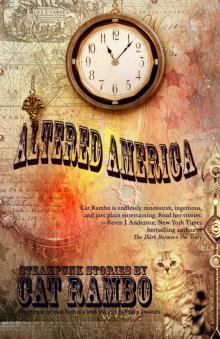 Altered America
Altered America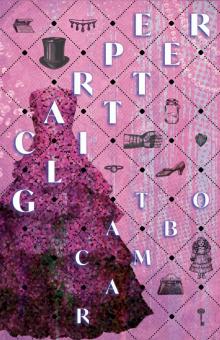 Carpe Glitter
Carpe Glitter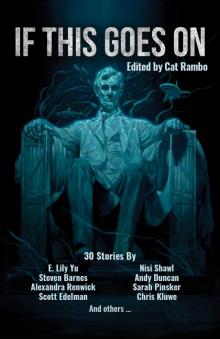 If This Goes On
If This Goes On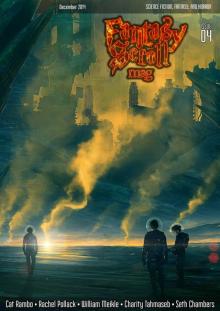 Fantasy Scroll Magazine Issue #4
Fantasy Scroll Magazine Issue #4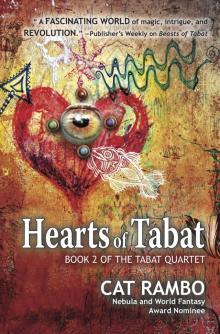 Hearts of Tabat
Hearts of Tabat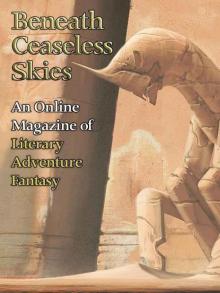 Beneath Ceaseless Skies #151
Beneath Ceaseless Skies #151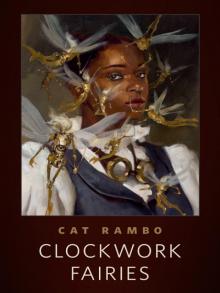 Clockwork Fairies
Clockwork Fairies Beneath Ceaseless Skies #170
Beneath Ceaseless Skies #170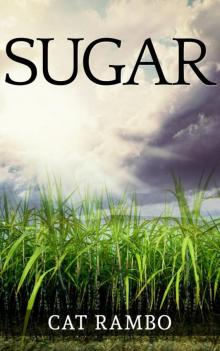 Sugar
Sugar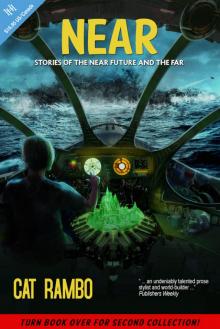 Near + Far
Near + Far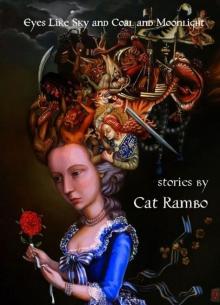 Eyes Like Sky And Coal And Moonlight
Eyes Like Sky And Coal And Moonlight